Analysis: Write-In Biden campaign a success, while Trump’s struggle with undeclared voters continues
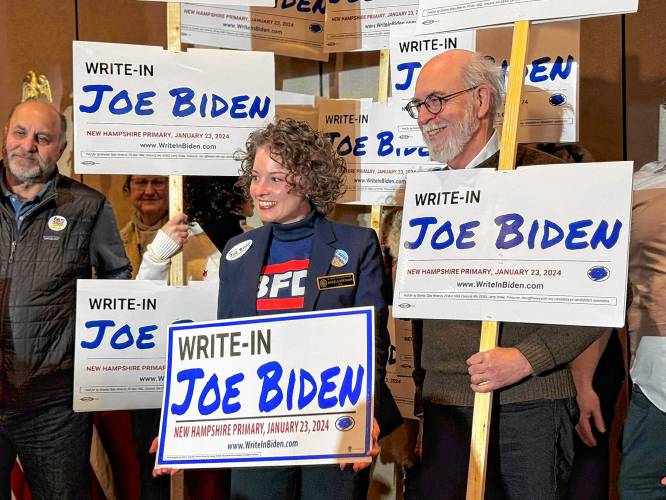
Angela Brennan holding a "Write-In Biden" sign at a primary night watch party on Tuesday, Jan. 23, 2024. Colin Booth—Courtesy
|
Published: 01-24-2024 5:41 PM
Modified: 01-24-2024 6:33 PM |
State Rep. Angela Brennan knew how important Tuesday’s Democratic primary was even though President Joe Biden’s name would not appear on the ballot.
Part of the “Write-In Biden” campaign, Brennan, of Bow, helped lead organizing efforts over the last several months, from weekly organizing calls on Zoom, to holding house parties, to traditional GOTV efforts in the freezing cold to make sure Democrats around the state knew how to properly vote for the President.
Though the outcome was never expected to be particularly close, it was an effort to hedge against a disastrous result — one where challengers, Minnesota congressman Dean Phillips or author Marianne Williamson, would come away with a win. With over 12,000 write-in votes still to be processed, Biden is on track to capture roughly two-thirds of the vote.
As of Wednesday afternoon, his 64,445 votes exceeded the 49,080 former President Barack Obama received when his name appeared on the ballot during his 2012 re-elect primary, though Obama did not face any opposition in that election. Still, Brennan saw the turnout as evidence for excitement around Biden’s re-election effort.
“There is an enthusiasm, an energy for Joe Biden and for defending our democracy and for solutions over sideshows, and it’s incredible,” she said. “We’ve been building this momentum to take us through this critical election year so that we can deliver a brighter future for all Granite Staters, all Americans and be the example for the rest of the nation on mobilizing around protecting our democracy and our freedoms and opportunities for everyone.”
That issue of preserving democratic norms, she said, was a particularly potent motivator among Democrats she made contact with throughout the campaign, even though Biden decided not to participate in the primary because he and national Democrats wanted South Carolina to hold the first primary.
“We heard from a lot of people that really understand the stakes in this election as being a choice between democracy and dictatorship,” she said, referencing former President Donald Trump’s comments about being a dictator on “day one” of his presidency. “They understand the consequences of elections. Politics is kind of our state sport here. People take it seriously. They didn’t want to let an opportunity go by without exercising their right to vote and their opportunity to fulfill their civic responsibility.”
For those reasons, some Democrats reluctantly wrote in the president’s name.
Article continues after...
Yesterday's Most Read Articles
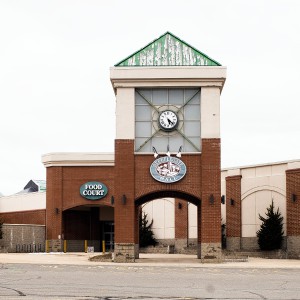 Neighboring landowner objection stalls Steeplegate redevelopment approval
Neighboring landowner objection stalls Steeplegate redevelopment approval
 Northeast Coffee Festival comes to Concord this weekend
Northeast Coffee Festival comes to Concord this weekend
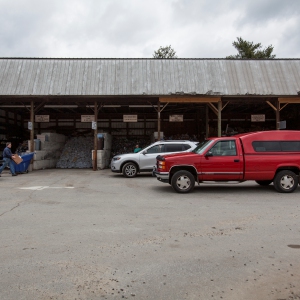 Hopkinton tries to nab out-of-town trash bandits
Hopkinton tries to nab out-of-town trash bandits
 On the Trail: Democrat Maggie Goodlander jumps into race to succeed Kuster
On the Trail: Democrat Maggie Goodlander jumps into race to succeed Kuster
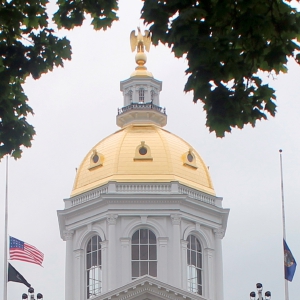 NH Senate panel frowns on bill to ease vehicle inspection requirements
NH Senate panel frowns on bill to ease vehicle inspection requirements
 Steeplegate project to reopen to public comment as developer seeks to reduce required parking
Steeplegate project to reopen to public comment as developer seeks to reduce required parking
“The fact that the president chose to boycott the state, he didn’t come to speak anywhere, he didn’t come to meet the voters of this state, it was very disappointing,” said Patricia Garrison, of Boscawen on Tuesday. “At the end of the day, he’s the better choice as far as I’m concerned.”
Neither Phillips nor Williamson gave any indication that they would drop out of the race. Phillips and supporting Super PACs spent over $5 million on his campaign that received less than 20% of the vote, while more voters wrote in other options besides Biden than voted for Williamson.
Former South Carolina Governor Nikki Haley won 60% of independents in Tuesday’s primary. Trump won 74% of Republicans. That math bodes remarkably well for his chances of locking up the Republican Party’s nomination for the third straight time, but how much stock should be put in his continued struggles with independent voters?
According to AP VoteCast, 21% of Republicans who voted on Tuesday said they would not vote for Trump in the November general election; 15% of Republicans who voted in last week’s Iowa Caucus said the same thing.
Biden won self-described independent voters in the 2020 general election, 54%-41%, so Trump would need to perform better with that group in November if he wants to return to the White House.
University of New Hampshire Survey Center Director Andrew Smith, though, expressed caution over placing too much emphasis on what message Tuesday sends about November.
“I know that there’s a lot of discussion about the weakness that Trump has had within those groups, but he had trouble with those groups in 2020 and in 2016. This is not a new story,” he said. “I think it’s overblown to put too much credence into what exit polls are showing about that given the nature of the electorate and the fact that there was really no Democratic primary to speak of.”
In addition, Smith noted, while current polls show a larger-than-usual number of Republicans showing they won’t support Trump in November, voters tend to flock back to their party when they ultimately have to make a decision.
“Americans have a great ability to rationalize why their party’s skunk is better than the other party’s skunk. I think that’s what’s going to likely happen in November,” he said. “In my mind, it’s way too early to draw conclusions about what’s likely to happen in November when most voters, even in New Hampshire, aren’t really paying that much attention to the general election yet.”


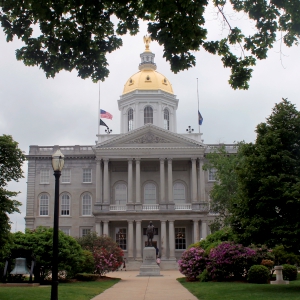 Transgender sports ban receives Senate committee support
Transgender sports ban receives Senate committee support House passes bill to raise minimum marriage age to 18, sending it to governor
House passes bill to raise minimum marriage age to 18, sending it to governor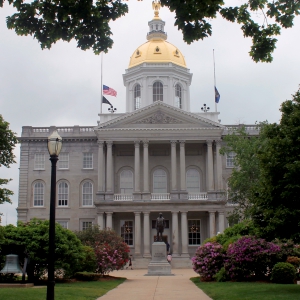 Charities will not have to pay rent to casinos under new law
Charities will not have to pay rent to casinos under new law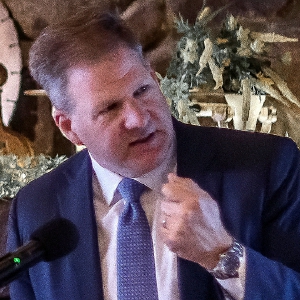 Sununu says he’ll support Trump even if he’s convicted
Sununu says he’ll support Trump even if he’s convicted
